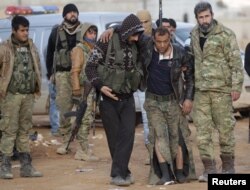The Trump administration’s decision to end the CIA's semi-covert arming of Syria’s rebel militias came as no surprise to the insurgent commanders, who’ve been battling the government of President Bashar al-Assad for half a decade.
But they remain angry at what they see as being cast off by an unreliable ally, who, they say, never supplied them with sufficient weapons — especially shoulder-fired anti-aircraft missiles — that they argue would have enabled them to win the war against Assad.
They say the decision to end a program that U.S. president Barack Obama started in 2013 amounts to a final abandonment of non-jihadist insurgent militias. They warn it will likely prompt more fighters to join al-Qaida and other extremist groups — if for no other reason than to survive.
Some regional experts and U.S. politicians say the move will hurt the moderate rebels.
Charles Lister, an analyst at the Middle East Institute and author of several studies on the moderate rebels, tweeted: “Moscow will be delighted. Russia’s biggest, most important target was U.S.-vetted FSA groups. We just killed them off.”
Joshua Landis, director of the Center for Middle East Studies at the University of Oklahoma, agrees the move may well mark the end of the rebellion. “The cutoff of CIA funding for Syria's rebels is the raggedy ending of America's failed regime-change policy in Syria and the region at large,” he told VOA.
'Stupid wars'
Landis says there should be no surprise at the decision. “President Trump called the wars in the Middle East stupid wars, during his campaign. He called America's policy of regime change a ‘failed policy.’ This is his effort to concentrate narrowly on eliminating ISIS and ending Washington's effort to drive Assad from power by force of arms. He believes that working with the Russians, the United States, will destroy ISIS more quickly.”
Lindsey Graham, a Republican senator and backer of the Syrian rebels from the start, views the development as a setback for the U.S. He tweeted: “a big loss for: 1) Syrians who have been relentlessly attacked by Assad, 2) Our Arab partners, 3) U.S. standing in the Middle East.”
Russia, which backs Assad, has long urged the U.S. to stop supplying arms to the rebels, arguing they are terrorists.
Rebels fear that it will now be open season on them in the north of the country and in parts of the southwest, where the Lebanese Shi’ite militia Hezbollah has said it is preparing to launch an offensive along the Lebanon-Syrian border.
“The regime will increase the rate of military operations to achieve greater control over rebel territory and the intransigence will increase of an emboldened Assad so that no just or comprehensive and lasting solution to the war will be reached,” predicts Salim Idris, a former top commander of the Free Syrian Army.
“The reasons for the conflict will continue to exist, violence will not stop and that is interests of al-Qaida and other terrorist groups that thrive in conditions of chaos,” Idris told VOA.
Trickle of arms
For Idris and other rebels the cutting off of supplies takes away any remaining leverage they and Western powers may have had in negotiations to end the multifaceted conflict that’s left up to half-a-million Syrians dead, six million internally displaced and forced five million to flee the country.
Even before Trump’s decision to end the weapons program for the FSA and other militias, the rebels had been receiving only a trickle of U.S. arms and ammunition from the agency — little more than just enough to keep them going.
And that was the case even before Donald Trump entered office this year.
The U.S. scaled back the CIA program in late 2015 as a Russian-backed government offensive started north of Aleppo. Former U.S. officials say Obama feared that increasing supplies to the rebels — especially anti-aircraft missiles — would drag the U.S. deep into a quagmire and risked triggering a confrontation between the U.S. and Russia.
At the time, U.S. policymakers also were grappling with the failure of an additional American train-and-equip program aimed at mustering a rebel army to focus not on Assad but on Islamic State.
Few moderate or Islamic rebel factions were prepared to switch their attention to IS, arguing their priority enemy had to remain the government in Damascus. Volunteers were few in number and 60 recruits who had graduated were sent inside Syria as a vanguard but they were routed by an al-Qaida affiliate.
Now, in the wake of the Trump decision, FSA units will face stark choices. They will be even more at the mercy of Turkey and Gulf states for supplies.





